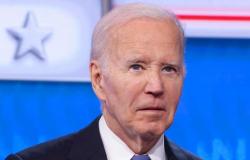The popular support at the polls for the until now mayor of Mexico City has been incontestable. Almost as much as the earthquake caused by the National Regeneration Movement (Morena) led by President Andrés Manuel López Obrador (AMLO), which has gone from controlling four to 25 states in the country in his six years in office, has grown in the 32 of its federal space after winning seven of the nine governors at stake and monopolizes the majority of the 628 deputies in Congress and the 19,000 municipal positions.
The dolphin politics of AMLO surpassed his mentor by five points, obtaining 59% of the votes against the tripartite of the historic PRI that governed uninterruptedly with his perfect dictatorship of hand-picked appointments to his presidential successors and his hidden but frequent caciquil habits during the first 71 years of the country’s independence, the conservative PAN and the PRD.
Strength and Heart for Mexicothe coalition created in 2021 that featured businesswoman Xóchitl Gálvez as its headliner, tense the electoral arena with nationalist messages such as We must save the country either Mexico is at risk because Morena is taking the country to the abyss. However, she succumbed en bloc to AMLO’s heir, who stood out for her university activism as historian Ana Sofía Rodríguez Everaert recalls, but whose leadership “goes beyond being the first woman to become the Head of the Mexican State” for having behind her a career as an engineer and academic in energy and renewable sources of “recognized prestige.” In addition to “a legacy of tenacity” to promote socio-economic transformations that she “has no comparison” with her predecessors in office.
Claudia Sheinbaum (61) shares with AMLO her thesis to overcome neoliberalism and her rejection of any privatization process, which they link to acts of corruption. But “she is more pragmatic and less ideological” than her mentor, and her alternative perception includes the construction of an “authentic welfare state” that stands, in her words, as the “great raw material” of the country, explains Isidro Morales. analyst at the Center for the United States and Mexico.
Sheinbaum does not renounce the energy sovereignty of Mexico, which is written in golden letters in the Magna Carta and which prohibits the privatization of Pemex, the oil jewel of the fifth largest crude oil producer in America, although he staunchly defends that economic change passes through end of net CO2 emissions and renewable energy. He will not tremble either when it comes to establishing a reformist agenda that raises the country’s health quality, removes its workers from the underground economy and improves the technical skills of its professionals and academic skills of its students. Nor, of course, the reconfiguration of bilateral relations with the United States, at all levels and as a foreign priority.
Shannon O’Neil, from the Council on Foreign Relations (CFR), believes that circumstances could arise for them to reset. In his opinion, the leadership changes – “possibly in both countries”, but even under another Biden mandate -, outline that scenario and would leave behind six years in which AMLO “has known how to carve out domestic popularity by redirecting politics to his benefit.” American immigration law,” he clarifies in Foreign Affairs. While diluting “the US’s concern about trade disputes”, despite the fact that Mexico has become the first supplier in its market – to a certain extent, due to the Chinese-owned factories in its territory and, especially, in the automotive sector -. by AMLO’s government management or by the scourge of organized crime and social defenselessness in the face of the violence of its southern neighbor.
Different approaches, according to the tenant of the White House
O’Neill appreciates bilateral progress in the event of Trump’s victory precisely in security, with Biden more inclined to synchronize green roadmaps, economic agendas in favor of prosperity, the fight against inequalities and the strengthening of the middle classes. Both will bring another round of negotiations to the fore to rebuild trade gateways and business agreements. Of course, the Republican will demand productive standards disguised as fair and equitable trade to hinder the frenetic flows of Mexican goods and services and the Democrat will seek guarantees of financial stability and reconcile recipes Keynesian as an antidote to the new neoliberal tax cuts that Trump would implement and that would generate more dumping tax to its Nafta 2.0 partner.
On the Mexican side, Sheinbaum will lack the internal ascendancy of AMLO, which has given him a period of civil stability and good security of the resources available to his predecessor. The budgetary restraint returns to Mexico as to other industrialized and emerging latitudes. Although, in the event of Biden’s victory, the future Mexican president will have the opportunity to delve deeper into the bilateral and multilateral levels; For example, on the North American trade agreement (USMCA), launched by Trump, and to which the Democratic leader has set the challenge of harmonizing industrial policies, revitalizing value chains and promoting goods, services and capital.
The White House granted Mexico special access and treatment to Inflation Reduction Act (IRA) subsidies for the manufacture of electric vehicles and was considering doing the same with its Chips & Science Act to aid semiconductor manufacturing. Biden’s support for stimulating unionism has not only permeated the US, but has also been exported to Mexico. But where the Sheinbaum-Biden tandem would have the most margin would be in the creation of decarbonized economies.
Mexico still doubles the contribution of fossil fuels in its energy mix and is far from the commitments of the Paris Agreement, they say in Climate Action Tracker, which predicts an increase in Mexican CO2 emissions in the future. Unless, as Morgan Stanley calculates, Mexico dedicates the 40 billion dollars in green investments promised in the next five years to renewable electricity generation, an arsenal that its private companies lack, but that they can profile through state, multilateral – the USMCA- and bilateral, for direct access to the IRA or the trillion-dollar American infrastructure plan.
Asylum control in exchange for energy and economic ties
O’Neill believes that the deepening of bilateral relations would occur once it is known which of the two American candidates will obtain their second term and that immigration, despite being one of the springboards of the resistance of the largest global economy to enter recession, will be the cornerstone. The almost 400,000 pending asylum cases show that the rules and controls are not effective and that, perhaps, “the solution lies in the Mexican demand to receive funds to contain the migratory waves and in the White House’s use of federal resources that include to the millions of refugees and asylum seekers in their communities “in the face of the demand for work” in an economy of full employment and millions of unfilled vacancies.
In addition, open dialogue would allow the next tenant of the Oval Office to accelerate the asylum model, incorporate specialized judges or inaugurate administrative offices to eliminate the long waiting list, which can range from months to years.
The high tension that this issue arouses was confirmed less than 48 hours after Sheinbaum’s victory, with Biden’s executive order to restrict the entry of immigrants, make it difficult to grant asylum to undocumented people and apply immediate deportations when the 2,500 are exceeded. border crossings per week, a law imposed by Trump with clear electoral overtones. In diplomacy, when the rope is tightened enough, but without breaking, disparate interests end up intertwining in common causes.
Sheinbaum will bet on the economy and international forums
Julián Ventura, Mexican diplomat who acts as an analyst for the think tank Chatham House expects from Sheinbaum a substantial improvement in his country’s image in economic and multilateral forums. “It will prioritize ties with Brazil” – after all, it is the fourth of the five large Latin American economies with progressive leaders; all, with the exception of the Argentina of the anarcho-capitalist Javier Milei -, which grants all of them an undoubted power of interlocution with the ideologues of the Secretariats of State and the Treasury of the back door of the US, already AMLO’s successor “in the G-20.”
From the hand of Luiz Inacio Lula da Silva will also carve out a personal role at COP29 in its “priority energy transition and where he will be able to show his courage with one of his great political weapons” towards which his predecessor did not show any special sensitivity. And, if he manages to forge a fluid dialogue with his American counterpart, he will have the opportunity to revitalize, within the review of the USMCA in 2026, commercial ties, investors and pacts to supply chips and modernize border infrastructure with his two northern partners. which, in return, will demand restrictions on Chinese capital residing in Mexico.
The reactivation of the Global Agreement with the EU and the additional one with the United Kingdom post-Brexit would give it credentials abroad and help it combat protectionist temptations. Just as if it manages to weave together an economic diplomacy that pivots in Asia interchangeably towards the US Indo-Pacific initiative and towards the Trans-Pacific Partnership (CPTPP) led by China.
This is what the columnist Bloomberg Juan Pablo Spinetto calls the “Sheinbaum dilemma”, who must choose at all times between the continuity demanded by his predecessor and voters or attending to the “inevitable winds of change and building the welfare state” with the largest deficit since the 1990s. the eighties. In this sense, Joan Domene, chief economist for LatAm at Oxford Economics, highlights that Morena’s comfortable parliamentary majority is an incentive for it to activate structural reforms, many of which will require constitutional changes, although with the slab of a return to the economic stability marked by a GDP that will only grow around 2% this biennium.






